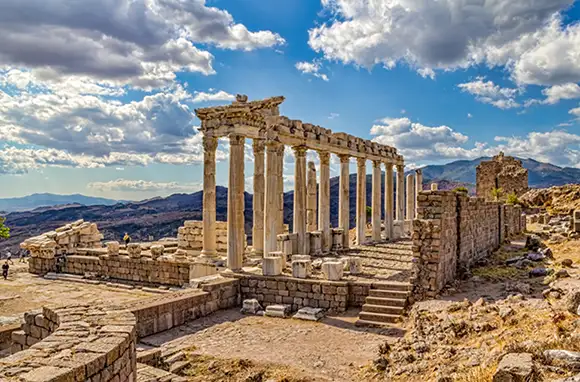
Say this for the Romans: They sure got around. Wherever you go in Europe, the Middle East, or Northern Africa, chances are the Romans managed to veni, vidi, vici their way through it about 2,000 years before you. It turns out all roads really do lead to Rome. Here are our picks for the best Roman ruins outside of Rome.
Image Gallery
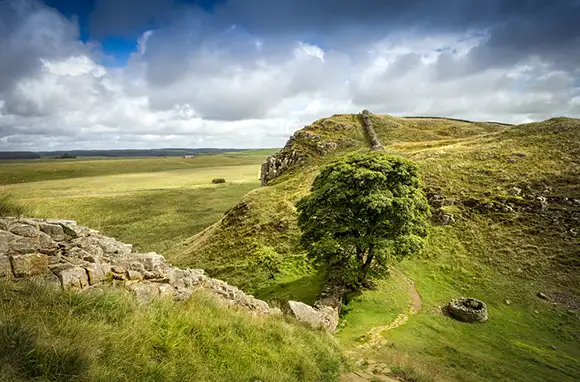
Hadrian's Wall, England
Built at the order of the Roman Emperor Hadrian to keep the advancing "barbarians" at bay, Hadrian's Wall is essentially the Roman version of the Great Wall of China. The largest ancient structure in all of Northern Europe, this 70-mile barrier looms defiantly over the undulating hills of Northumberland.
An official long-distance walking trail spans 84 miles and runs east–west from Wallsend to Bowness-on-Solway, providing a coast-to-coast tour of Northern England. The most spectacular section of the wall starts at the well-preserved remains of the Roman fort at Housesteads.

Hadrian's Wall, England
Built at the order of the Roman Emperor Hadrian to keep the advancing "barbarians" at bay, Hadrian's Wall is essentially the Roman version of the Great Wall of China. The largest ancient structure in all of Northern Europe, this 70-mile barrier looms defiantly over the undulating hills of Northumberland.
An official long-distance walking trail spans 84 miles and runs east–west from Wallsend to Bowness-on-Solway, providing a coast-to-coast tour of Northern England. The most spectacular section of the wall starts at the well-preserved remains of the Roman fort at Housesteads.
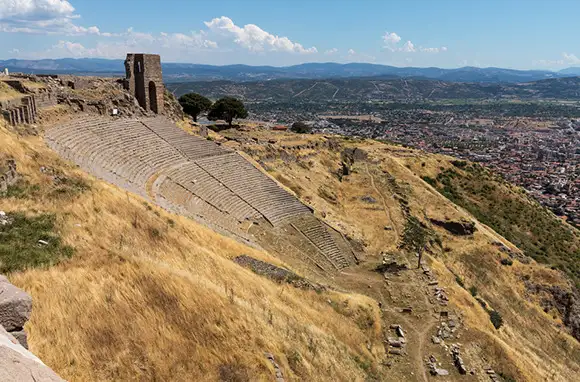
Pergamon, Turkey
Of the two major Roman ruins in Turkey, Ephesus is the one most people will tell you to visit because of its large collection of ruins. But for my money, Pergamon is the more breathtaking. What it lacks in quantity it makes up for in quality. Two words: mountaintop acropolis.
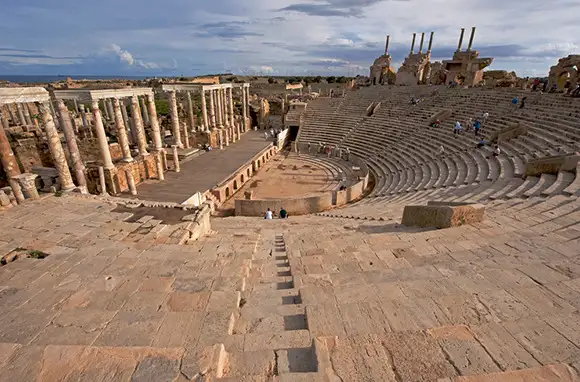
Leptis Magna, Libya
Spectacular Leptis Magna was a major Roman coastal city located in modern-day Libya, about 80 miles east of Tripoli. Today, it's not only one of the best Roman sites in the Mediterranean, it's also one of the least visited. Regional turmoil notwithstanding, this is an archaeological site not to be missed. Among the highlights: five massive mosaics that depict warriors and gladiators currently on display in the Leptis Magna Museum.
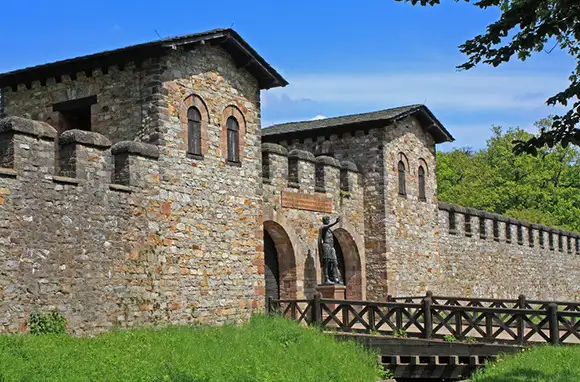
The Saalburg, Germany
The reconstructed Roman fort known as the Saalburg ("hall castle") in Bad Homburg, Germany, is part of the UNESCO World Heritage Site Limes, which represents the frontier between the Roman Empire and the Germanic tribes.
As many as 2,000 people once lived inside the fort and its surrounding village, which today feels like a time machine to ancient Rome. The fortifications include defensive walls, a rampart walk, four gateways, a granary, and barracks. The onsite archaeological museum includes a cafe with a replica Roman cook stove and culinary offerings typical of Roman times. A short walk outside the fort brings you to the Saalburg Circuit Trail, where a section of the ruined border has been reconstructed.
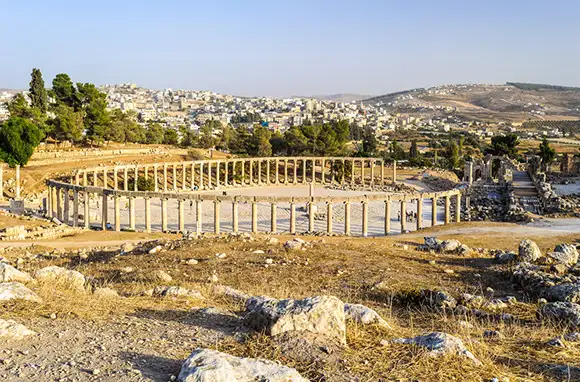
Jerash, Jordan
Located about 30 miles from Amman, the ruins of the Roman city Jerash (also called Gerasa) are among the most popular archaeological sites for tourists in Jordan. And little wonder: Situated in a valley in the shadow of the Gilead Mountains, the ruins here are so extensive that it's worth setting aside an entire day to fully explore them. Daily reenactments (think gladiators, charioteers, and legionnaires) help bring the history to life.
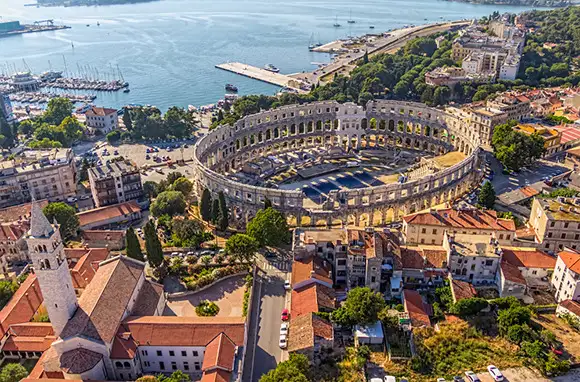
Pula Arena, Croatia
The Roman amphitheater in Pula, Croatia, was constructed during the reign of Emperor Vespasian in the first century CE and is one of the largest and best-preserved Roman amphitheaters in the world. Originally used for gladiator fights, Pula Arena remains in use to this day—for concerts, that is.
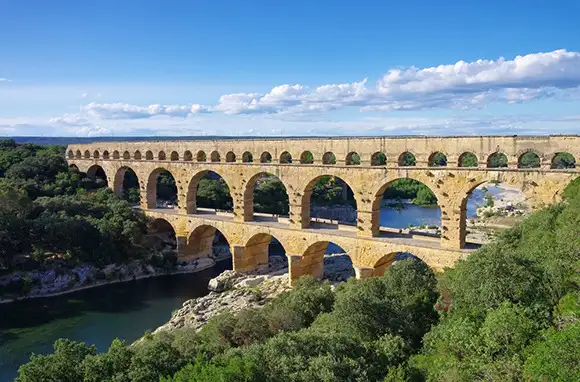
Pont du Gard, France
Part of the Roman aqueduct of Nimes, the Pont du Gard is a bridge built between 40 and 60 CE. It was designed to move fresh water over France's Gard River. At 900 feet long and 160 feet high, it's a spectacular sight to behold and a testament to the enduring genius of Roman engineering.
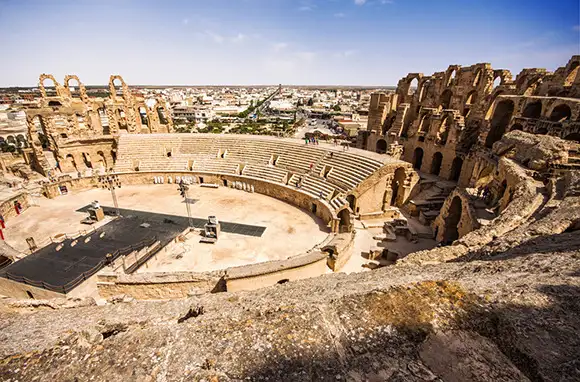
El Jem, Tunisia
One of the largest Roman amphitheaters outside Italy, Tunisia's El Jem remains a living destination that seats up to 30,000 people. In the summer, spectators flock to the International Festival of Symphonic Music to enjoy classical concerts in this ancient setting. The nearby El Jem Museum is also worth a visit for its reconstruction of a Roman villa.
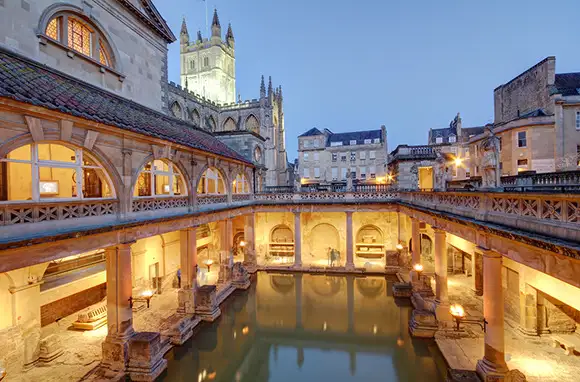
Bath, England
The Roman temple in Bath, England, was constructed around 60 to 70 CE, during the Roman occupation of Britain. Construction of the hot springs bathing complex, however, gradually took place over the ensuing three centuries. What remains of the baths today are below street level in the modern town and accessible to tourists for viewing only—no bathing. (The nearby Thermae Bath Spa allows modern-day visitors the chance to soak in the same mineral-rich waters, however.) More than a million people visit the Roman baths every year.
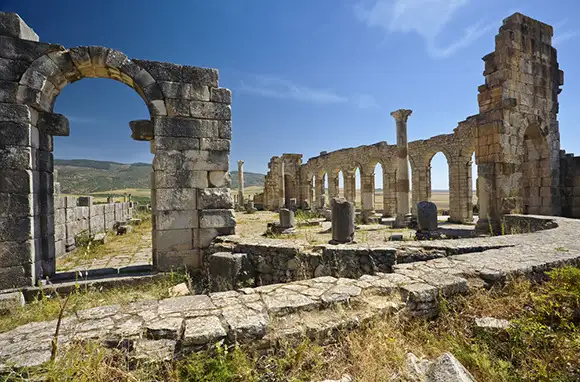
Volubilis, Morocco
Situated in Morroco between the modern cities of Fes and Rabat, Volubilis began as a Phoenician settlement in the third century BCE, before expanding significantly under Roman occupation until it fell to local tribes in the third century CE. Today, it is a UNESCO World Heritage site and considered noteworthy as an example of "a large Roman colonial town on the fringes of the Empire."
You Might Also Like:
We hand-pick everything we recommend and select items through testing and reviews. Some products are sent to us free of charge with no incentive to offer a favorable review. We offer our unbiased opinions and do not accept compensation to review products. All items are in stock and prices are accurate at the time of publication. If you buy something through our links, we may earn a commission.
Related
Top Fares From
Today's Top Travel Deals
Brought to you by ShermansTravel
Shop and Save with Country Inns...
Patricia Magaña
 Hotel & Lodging Deals
Hotel & Lodging Deals
$229 -- Chicago: Discounted Rates and...
Francesca Miele
 Hotel & Lodging Deals
$229+
Hotel & Lodging Deals
$229+
$188 -- Honolulu: Save on Oceanview...
Abigail Lamay
 Hotel & Lodging Deals
$188+
Hotel & Lodging Deals
$188+






